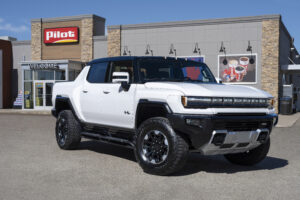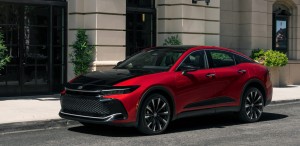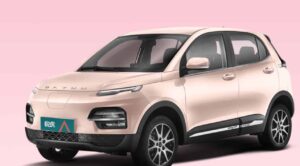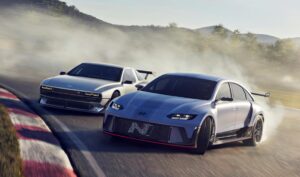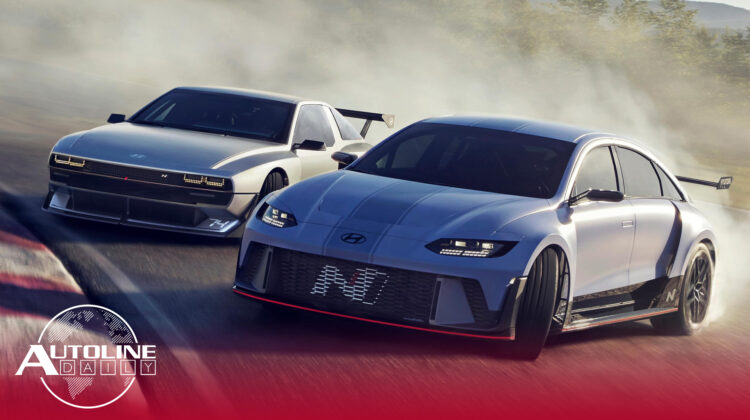

Follow us on social media:
Runtime: 10:32
0:08 BMW USA Says It Won’t Charge for Heated Seats
1:04 EU Car Sales Lowest in 26 Years
1:26 Saudis Invest in Aston Martin
2:49 Hau Thai Tang Leaving Ford
3:45 GM Building Nationwide Charging Network
4:40 Fiat 500e Best Selling EV in EU
6:05 Toyota Drops Avalon, Replaced by Crown
7:19 Cheap EVs Take China by Storm
8:15 Hyundai N Goes Electric
Visit our sponsors to thank them for their support of Autoline Daily: Bridgestone, Intrepid Control Systems, MEDC and Schaeffler.
This is Autoline Daily, the show dedicated to enthusiasts of the global automotive industry.
BMW USA SAYS IT WON’T CHARGE FOR HEATED SEATS
BMW got hit by a global backlash over its plans to charge customers a monthly fee to use their heated seats or heated steering wheel. All over social media, people ridiculed the company. And BMW got the message. Or at least some parts of the company did. Yesterday, BMW of North America put out a statement assuring customers it was not going to charge them to heat their seats. But it did warn them that it’s starting a program called Functions On Demand, where it will charge a monthly fee to use things like remote engine starting and a dash cam. In the future, customers will be able to download other features. For a fee, of course. BMW says this is an aftersales strategy it’s using around the world and it will not affect options that customers chose when they bought their cars.
EU CAR SALES LOWEST IN 26 YEARS
Sales of new cars are weak all over the world, but they’re especially weak in Europe. Automakers sold 1 million vehicles there last month, but Reuters reports that’s the lowest they’ve been since 1996. Most automakers are reporting double digit drops with some of the biggest drops coming from Stellantis, Volkswagen, JLR and Volvo.
SAUDIS INVEST IN ASTON MARTIN
Saudi Arabia’s Public Investment Fund sure likes to invest in automotive luxury brands. It’s going to take a stake in Aston Martin, and has already invested in McLaren and Lucid. In fact, Lucid is supposedly going to build an assembly plant in Saudi Arabia. Interestingly, Aston got another offer that it turned down. That was from an Italian group called Investindustrial and the Chinese automaker Geely. But that investment would have made them the largest shareholders in Aston. So Aston’s chairman, billionaire Canadian Lawrence Stroll, who is the largest shareholder, shot down that proposal, saying it was a takeover in disguise. Besides, he still wants to be the big boss.
HAU THAI TANG LEAVING FORD
Yesterday we had some important personnel changes to report and today we’ve got another one. Hau Thai Tang is retiring from the Ford Motor Company at the age of 56 after 34 years with the company. He spent much of his career in product development and played a key role in working on some of Ford’s most iconic vehicles including the Mustang, Bronco, Maverick, Puma, Mach-E and F-150 Lightning. In his latest role as chief industrial platform officer, he bridged the gap between Ford’s two new business groups: Ford Blue, which handles all its ICE vehicles, and Ford Model e, which handles all the BEVs. Hau Thai Tang was our guest on Autoline multiple times and we’re going to sorely miss his insights into the industry. He’ll retire on October 1, but Ford has not named a replacement for him yet.
GM BUILDS NATIONWIDE EV CHARGING NETWORK
Critics of electric cars, and there sure are a lot of them, keep complaining that the public charging infrastructure simply isn’t ready for the EV revolution. So General Motors took a big step forward announcing it’s going to build out a nationwide network of fast chargers in the US. That includes 2,000 charging stalls that will be located at rest stops on major highways. They’re going into rest stops operated under the Pilot and Flying J brand names, and the chargers will be operated and maintained by EVgo. The chargers will be available for any car brand, but GM customers will get special benefits like discounts and exclusive reservations to use the chargers. GM says this shows how public and private entities can come together to build out the nation’s charging infrastructure.
FIAT 500e IS BEST SELLING EV IN EU
Guess what was the best selling electric car in Europe for the second quarter? You’re never going to guess this one. If you thought it was the Tesla Model Y or Model 3, join the club. That’s what we thought. But according to the website EU-EVs, which tracks sales of EVs in Europe, the best selling electric in the second quarter was the Fiat 500E. The Model Y was second and the Model 3 was way down the list in 20th place. I mean, who ever thought Fiat would be at the top of the list?
TOYOTA DROPS AVALON, REPLACED BY CROWN
Say goodbye to the Avalon and hello to the Crown. Toyota is dropping the Avalon nameplate, which first entered the U.S. market in 1994, and is replacing it with the Crown. The Crown name will probably sound familiar to a lot of you. It’s been around forever in Japan, and was sold in the U.S. from 1958 until 1972. The all-new version is built on the same platform as the current Avalon, which is the same as the Camry. But the Crown features a raised ride height, which helps blur the line between sedan and crossover. It will be sold in three trim levels and offer two hybrid powertrain setups. A 2.5L 4-cylinder paired with two electric motors is standard. The other is a 2.4L 4-cylinder mated to a front electric motor and a rear eAxle, which combines for 340 horsepower. All-wheel drive is standard on both setups. While the exterior is wrapped in what Toyota calls “a bold new design” – and we’d love to know what you think – the interior is rather plain and is highlighted by a 12.3 inch display screen. Look for the all-new Crown to start hitting dealer lots in the U.S. later this year.
CHEAP EVS TAKE CHINA BY STORM
Wuling’s MINI EV has torn up the sales charts in China. And now more cheap EVs are on the way. Baojun, which is part of the GM-SAIC-Wuling partnership, is launching an updated version of the KiWi EV. You can think of this like an upscale version of the MINI EV. It has more power and a bigger battery pack and now comes with autonomous driving technology. The high-end version of this vehicle will sell for just under $15,000. And a company called Dayun is launching its own inexpensive EV, a small crossover, called the Yuehu. It features a 35 kW electric motor and 30 kWh battery, with 300 kilometers or roughly 185 miles of range, but that’s based on the very outdated NEDC test cycle. It starts at only $10,000.
HYUNDAI N GOES ELECTRIC
Just because it’s switching to electric doesn’t mean Hyundai is giving up on performance cars. The N brand is showing off a couple race cars that it’ll use as rolling test labs for future EVs. The first is a version of the IONIQ 6, but instead of 320 horsepower it has 576 and torque jumps from 446 pound feet to 545. Beyond that it has bigger brakes, a sportier suspension system and it’s even studying how to use regen braking to improve cornering and vehicle yaw. Now check out the N Vision 74 concept, which is inspired by the Pony Coupe Concept from 1974. Interestingly, this is a fuel cell EV. It features two electric motors that drive the rear wheels, which combine for 500 kW or 670 horsepower and a 4.2 kg hydrogen tank. It has a surprisingly large battery at 62.4 kWh. Most fuel cell EVs have a really small pack. For example the one in the Toyota Mirai is 1.6 kWh. Some of the technology here will make it into future performance EVs. A version of the all-electric IONIQ 5 N will hit global markets next year.
And that wraps up this week’s worth of shows. Have a great weekend and we’ll see you back here on Monday.
Thanks to our partner for embedding Autoline Daily on its website: WardsAuto.com
Seamus and Sean McElroy cover the latest news in the automotive industry for Autoline Daily.







